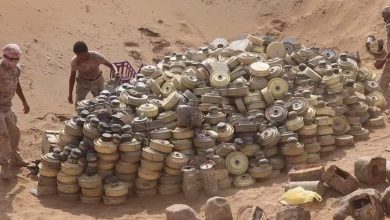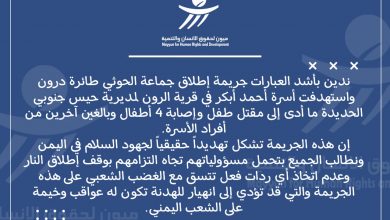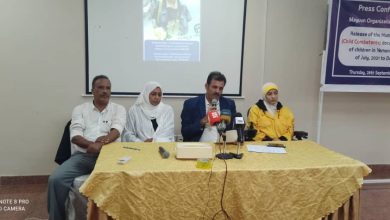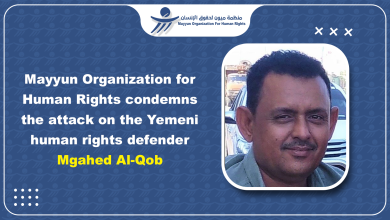We condemn the arrest of Judge Abdul-Wahab Qatran in Sanaa in Sanaa without bringing a charge.
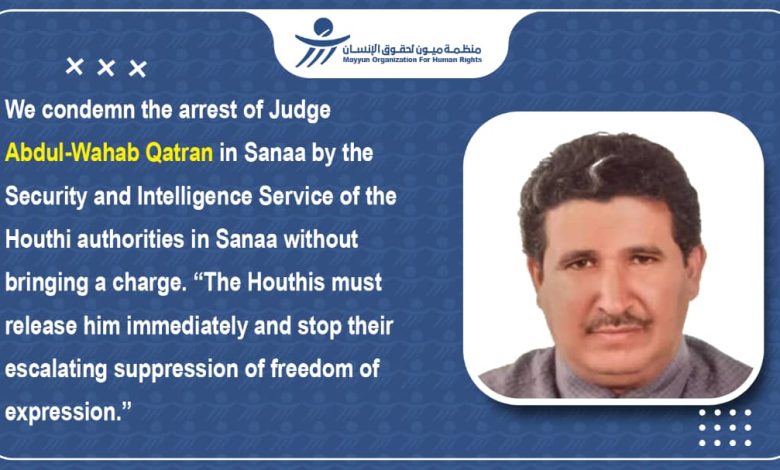
Mayyun Organization for Human Rights condemns the arrest by the Security and Intelligence Service of the Houthi authorities Judge: Abdul-Wahab Qatran, in Sanaa without bringing a charge, and “the Houthis must release him immediately and stop their escalating suppression of freedom of expression.”
The statements of the organization’s sources and testimonies given by eyewitnesses – including Mohammed Abdel-Wahab Qatran, the son of Judge Qatran – were consistent with the arbitrary measures that accompanied the arrest of Judge: Abdel-Wahab Qatran from inside his house located in the Ziraa neighborhood in the center of the capital, Sana’a, which began at ten in the morning on Tuesday, January 2, 2024, and continued until five. evening.
Sources and eyewitnesses confirmed that an armored vehicle, two military vehicles, and masked soldiers surrounded the home of Judge Abdel-Wahab Qatran, before gunmen wearing military uniforms and others in civilian clothes broke down the door of the house, stormed it, arrested the judge, intimidated his family, tampered with the property, confiscated part of it, handcuffed a number of his family members, and restricted their freedoms for hours.
Mayyun Organization confirms that these successive violations of the freedom of expression of journalists and activists on social media platforms, which are accompanied by security repression, brutal measures, and physical attacks, reflect the dire situation of human rights in areas controlled by the Houthi group.
During the days preceding Qatran’s arrest, Mayyun monitored that leaders and members of the Houthi group, through social media platforms, made serious accusations against Qatran, incited against him, and issued threats to him if he continued to express his opinions opposing the group’s practices, and the attacks carried out by the group on ships in the Red Sea, as the organization monitored. Qatran posted posts on his account on the “X” platform criticizing the practices of the Houthi group and other posts in support of rights and freedoms.
Hours before his arrest, Qatran wrote on the Death threats, beatings, and imprisonment.
Member of the Yemeni Parliament in Sanaa, Judge: Ahmed Saif Hashid, wrote on his account on the And freedoms, most importantly what remains of the right to opinion and expression. That is why all free people are concerned with defending Judge Abdel-Wahab Qatran in the face of an authority that has begun targeting you, your rights, and the rights and freedoms that have been achieved during the accumulation of a long struggle that extends to more than sixty years of the struggles of the National Movement. Yemeni.
According to neighbors of Qatran who were spoken to by armed men participating in the arrest operation, the judge was subjected to stigma as the gunmen promoted accusations of making and drinking alcohol, pointing to pictures of empty bottles of alcoholic beverages that the gunmen claimed to have found inside his house during the arrest operation.
Meanwhile, a member of the Yemeni Judges Club who spoke to the organization explained the purpose of this stigma as an authoritarian attempt to cast doubt on Judge Qatran’s eligibility to exercise his duties as a court judge, adding, “What weakens this stigma is the security services’ violation of civil rights and the judicial immunity enjoyed by a member of the judiciary, Judge Qatran.” These accusations may be considered slander against the judge, requiring those involved in making them to be held accountable.
Judicial Authority Law No. (1) of 1990 stipulates that “a judge may not be arrested or detained in custody except after obtaining permission from the Supreme Judicial Council, and the Minister of Justice must, upon arresting or detaining a judge in flagrante delicto, immediately report the matter to the President.” The Supreme Judicial Council authorized the continuation of his detention or ordered his release with or without guarantee, which are procedures that were not followed by the (incompetent) security apparatus that carried out the arrest, according to a source in the Ministry of Justice in the government of Sana’a, which is not internationally recognized.
Labeling opponents, journalists, and activists with moral crimes is a practice that the Houthi group has been accustomed to. On December 4, 2017, Al Masirah Channel (the official channel of the Houthi group) showed a television report showing bottles of alcoholic beverages that were claimed to have been found inside the house of the former Yemeni president following his killing at the hands of Houthi militants on the same day.
In the same context, on November 7, 2021, a court under the Houthi authorities sentenced the Yemeni actress and model, Entisar Al-Hammadi, and another woman to five years in prison on charges of committing an immoral act.
The incident of Judge Qatran’s arrest comes one day after the owner and director of Voice of Yemen Radio, journalist Mojli Al-Samadi, announced that he was physically assaulted by gunmen in front of his house in the capital, Sana’a, and his car was smashed. This was preceded one day by a trial session that issued a ruling that overturned a preliminary ruling stipulating the return of the private radio’s property. Owned by Al-Samadi and confiscated by the Houthi group.
This is the second attack against journalist Al-Samadi within four months because of his political opinions that he writes on social media platforms. Despite calls made by human rights organizations to conduct investigations and hold the perpetrators of attacks accountable, the Houthi group ignored those calls, which indicates the expansion of criminal behavior by those affiliated with the armed group. In the absence of the rule of law.
Mayyun Organization confirms that the areas under the control of the Houthis have become a repellent environment for politicians, activists, lawyers and journalists. “The Houthis, since their control of Sanaa, have not shown any respect for basic rights and freedoms, such as the right to express opinions. Their method of governance depends on spreading fear among the population and imprisoning and trying opponents, including They include religious minorities, women, and journalists.”


